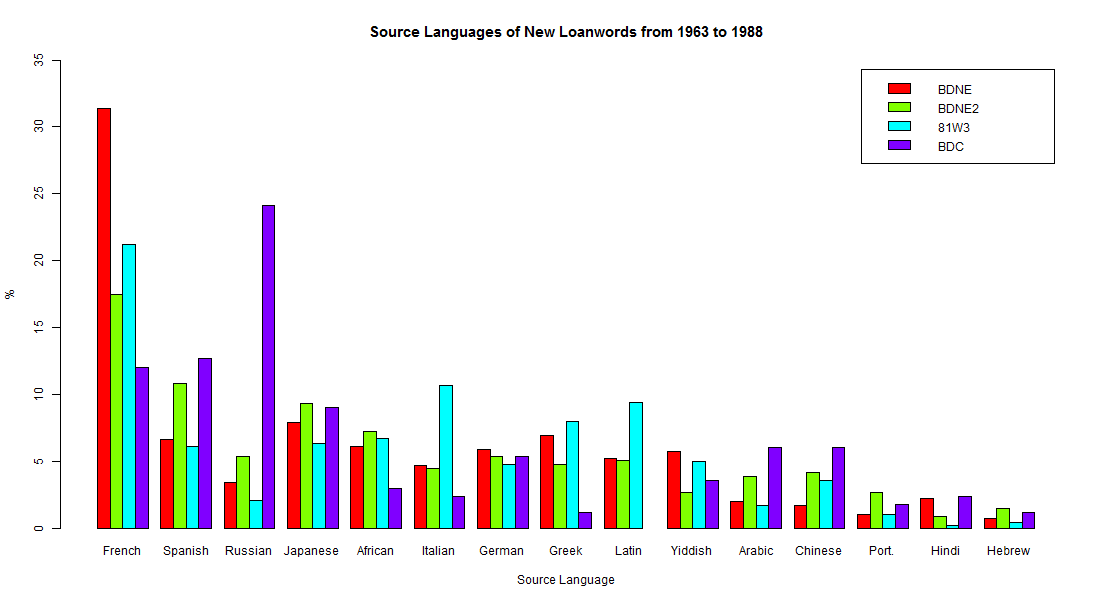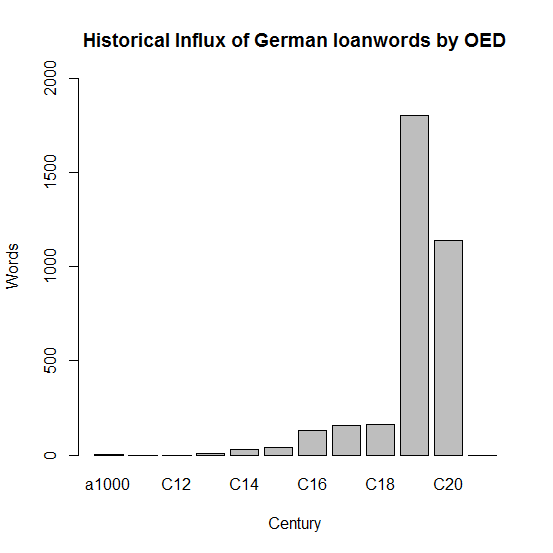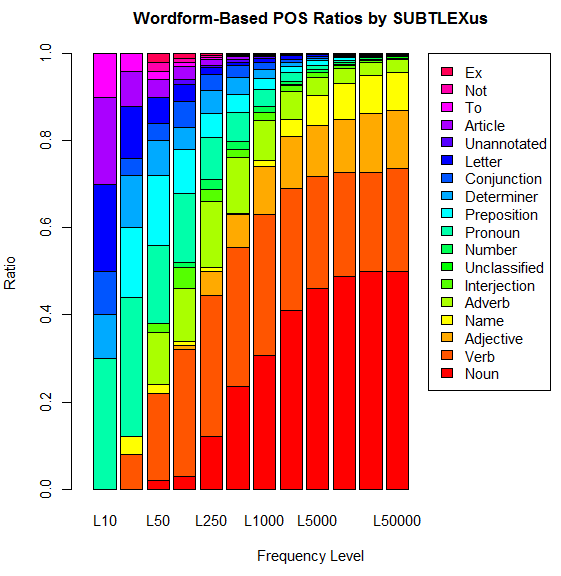2015-10-16 Fri
■ #2363. hapax legomenon [hapax_legomenon][terminology][lexicology][lexicography][word_formation][productivity][bible][zipfs_law][frequency][corpus][shakespeare][chaucer]
昨日の記事「#2362. haplology」 ([2015-10-15-1]) でギリシア語の haplo- (one, single) に触れたが,この語根に関連してもう1つ文献学や辞書学の用語としてしばしば出会う hapax (legomenon) を取り上げよう.ある資料のなかで(タイプ数えではなくトークン数えで)1度しか用いられていない語(句)を指す.ギリシア語の hapax (once) + legomenon (something said) からなる複合語だ.複数形は hapax legomena という.
"nonce word" を hapax legomenon と同義としている辞書もあるが,前者は「臨時語」と訳され「その時限りに用いる語」を指す.nonce-word は新語の臨時的な生産性を念頭に用いられることが多いのに対し,hapax legomenon は文献に現われる回数が1度であることに焦点が当てられているという違いが感じられる.nonce (その場限りの)という語の語源については,「#1306. for the nonce」 ([2012-11-23-1]) を参照.
hapax legomenon は,聖書の注釈との関連で,しばしば言及されてきた歴史がある.OED によると英語における初例は1692年のことで,"J. Dunton Young-students-libr. 242/1 There are many words but once used in Scripture, especially in such a sence, and are called the Apax legomena." とある.
文献学や語源学において,hapax legomenon はしばしば問題となる.その語の語源はおろか,意味すら不明であることが少なくない.語彙論や辞書学では,それを一人前の「語」として認めてよいのか,何かの間違いではないか,辞書に掲載すべきか否か,という頭の痛い問題がある (see 「#912. 語の定義がなぜ難しいか (3)」 ([2011-10-26-1])) .一方で,語形成やその生産性という観点からは,hapax legomenon は重要な考察対象となる.というのは,1度だけ臨時的に出現するためには,話者の生産的な語形成機構が前提とされなければならないからである (see 「#938. 語形成の生産性 (4)」 ([2011-11-21-1])) .
だが,実際のところ halax legomenon は決して少なくない.このことは,ジップの法則に照らせば驚くべきことではないだろう (see 「#1101. Zipf's law」 ([2012-05-02-1]), 「#1103. GSL による Zipf's law の検証」 ([2012-05-04-1])) .英語の例としては,Chaucer の用いたnortelrye (education) や Shakespeare の honorificabilitudinitatibus, また Dickens の sassigassity (audacity?) などが挙げられる.
2015-10-12 Mon
■ #2359. 英語が非民主的な言語と呼ばれる理由 (3) [history][loan_word][lexicology][borrowing][linguistic_imperialism][language_myth][purism]
標題と関連して,「#134. 英語が民主的な言語と呼ばれる理由」 ([2009-09-08-1]),「#1366. 英語が非民主的な言語と呼ばれる理由」 ([2013-01-22-1]),「#1845. 英語が非民主的な言語と呼ばれる理由 (2)」 ([2014-05-16-1]) で様々な見解を紹介してきた.今回は,主として英語が歴史的に他言語から多くの語彙を借用してきた事実に照らして,英語の民主性・非民主性について考えてみたい.
英語が多くの言語からおびただしい語彙を借用してきたことは,言語的純粋主義 (purism) の立場からの批判が皆無ではないにせよ,普通は好意的に語られる.英語の語彙借用好きは,ほとんどすべての英語史記述でも強調される特徴であり,これを指して "cosmopolitan vocabulary" などと持ち上げられることが多い.続けて,英語,そして英語国民は,柔軟にして鷹揚,外に対して開かれており,多様性を重んじる伝統を有すると解釈されることが多い.歴史的に英語国では言語を統制するアカデミーが設立されにくかったこともこの肯定的な議論に一役買っているだろう.また,もう1つの国際語であるフランス語が上記の点で英語と反対の特徴を示すことからも,相対的に英語の「民主性」が浮き彫りになる.
しかし,英語の民主性に関する肯定的なイメージはそれ自体が作られたイメージであり,語彙借用のある側面を反映していないという.Bailey (91) によれば,植民地帝国主義時代の英国人は,その人種的優越感ゆえに,諸言語からの語彙をやみくもに受け入れたわけではなく,むしろすでに他のヨーロッパ人が受け入れていた語彙についてのみ自らの言語へ受け入れることを許したという.これが事実だとすれば,英語(国民)はむしろ非民主的であると言えるかもしれない.
Far from its conventional image as a language congenial to borrowing from remote languages, English displays a tendency to accept exotic loanwords mainly when they have first been adopted by other European languages or when presented with marginal social practices or trivial objects. Anglophones who have ventured abroad have done so confident of the superiority of their culture and persuaded of their capacity for adaptation, usually without accepting the obligations of adapting. Extensive linguistic borrowing and language mixing arise only when there is some degree of equality between or among languages (and their speakers) in a multilingual setting. For the English abroad, this sense of equality was rare. Whether it is a language more "friendly to change than other languages" has hardly been questioned; those who embrace the language are convinced that English is a capacious, cosmopolitan language superior to all others.
Bailey によれば,「開かれた民主的な英語」のイメージは,それ自体が植民地主義の産物であり,植民地主義時代の語彙借用の事実に反するということになる.
ただし,Bailey の植民地主義と語彙借用の議論は,主として近代以降の歴史に関する議論であり,英語が同じくらい頻繁に語彙借用を行ってきたそれ以前の時代の議論には直接触れていないことに注意すべきだろう.中英語以前は,英語はラテン語やフランス語から多くの語彙を借り入れなければならない,社会的に下位の言語だったのであり,民主的も非民主的も論ずるまでもない言語だったのだから.
・ Bailey, R. Images of English. Ann Arbor: U of Michigan P, 1991.
2015-10-10 Sat
■ #2357. OED による,古典語およびロマンス諸語からの借用語彙の統計 [oed][statistics][lexicology][loan_word][borrowing][latin][greek][french][italian][spanish][portuguese][romancisation]
標題に関する,OED2 の CD-ROM 版を用いた本格的な量的研究を発見した.Culpeper and Clapham によるもので,調査方法を見るかぎり,語源欄検索の機能を駆使し,なるべく雑音の混じらないように腐心したようだ.OED などを利用した量的研究の例は少なくないが,方法論の厳密さに鑑みて,従来の調査よりも信頼のおける結果として受け入れてよいのではないかと考える.もっとも,筆者たち自身が OED を用いて語彙統計を得ることの意義や陥穽について慎重に論じており,結果もそれに応じて慎重に解釈しなければいけないことを力説している.したがって,以下の記述も,その但し書きを十分に意識しつつ解釈されたい.
Culpeper and Clapham の扱った古典語およびロマンス諸語とは,具体的にはラテン語,ギリシア語,フランス語,イタリア語,スペイン語,ポルトガル語を中心とする言語である.数値としてある程度の大きさになるのは,最初の4言語ほどである.筆者たちは,OED 掲載の2,314,82の見出し語から,これらの言語を直近の源とする借用語を77,335語取り出した.これを時代別,言語別に整理し,タイプ数というよりも,主として当該時代に初出する全語彙におけるそれらの借用語の割合を重視して,各種の語彙統計値を算出した.
一つひとつの数値が示唆的であり,それぞれ吟味・解釈していくのもおもしろいのだが,ここでは Culpeper and Clapham (215) が論文の最後で要約している主たる発見7点を引用しよう.
(1) Latin and French have had a profound effect on the English lexicon, and Latin has had a much greater effect than French.
(2) Italian, Spanish, and Portuguese are of relatively minor importance, although Italian experienced a small boost in the 18th century.
(3) The general trend is one of decline in borrowing from Classical and Romance languages. In the 17th century, 39.3% of recorded vocabulary came from Classical and Romance languages, whereas today the figure is 15%.
(4) Latin borrowing peaked in 1600--1675, and Latin contributed approximately 7000 words to the English lexicon during the 16th century.
(5) Greek, coming after Latin and French in terms of overall quantity, peaked in the 19th century.
(6) French borrowing peaked in 1251--1375, fell below the level of Latin borrowing around 1525, and thereafter declined except for a small upturn in the 18th century. French contributed over 11000 words to the English lexicon during the Middle English period.
(7) Today, borrowing from Latin may have a slight lead on borrowing from French.
この7点だけをとっても,従来の研究では曖昧だった調査結果が,今回は数値として具体化されており,わかりやすい.(1) は,フランス語とラテン語で,どちらが量的に多くの借用語彙を英語にもたらしてきたかという問いに端的に答えるものであり,ラテン語の貢献のほうが「ずっと大きい」ことを明示している.(7) によれば,そのラテン語の優位は,若干の差ながらも,現代英語についても言えるようだ.関連して,(6) から,最大の貢献言語がフランス語からラテン語へ切り替わったのが16世紀前半であることが判明するし,(4) から,ラテン語のピークは16世紀というよりも17世紀であることがわかる.
(3) では,近代以降,新語における借用語の比率が下がってきていることが示されているが,これは「#879. Algeo の新語ソース調査から示唆される通時的傾向」([2011-09-23-1]) でみたことと符合する.(2) と (5) では,ラテン語とフランス語以外の諸言語からの影響は,全体として僅少か,あるいは特定の時代にやや顕著となったことがある程度であることもわかる.
英語史における借用語彙統計については,cat:lexicology statistics loan_word の各記事を参照されたい.本記事と関連して,特に「#2162. OED によるフランス語・ラテン語からの借用語の推移」 ([2015-03-29-1]) を参照.
・ Culpeper Jonathan and Phoebe Clapham. "The Borrowing of Classical and Romance Words into English: A Study Based on the Electronic Oxford English Dictionary." International Journal of Corpus Linguistics 1.2 (1996): 199--218.
2015-10-05 Mon
■ #2352. 「動物とその肉を表す英単語」の神話 (2) [french][lexicology][loan_word][language_myth][lexical_stratification][animal]
「#331. 動物とその肉を表す英単語」 ([2010-03-24-1]),「#332. 「動物とその肉を表す英単語」の神話」 ([2010-03-25-1]),「#1583. swine vs pork の社会言語学的意義」 ([2013-08-27-1]) の記事で,有名な語彙の対立 calf/veal, deer/venison, fowl/poultry, sheep/mutton, swine (pig)/pork (bacon), ox/beef について,この話題のウラを考えた.Denison and Hogg (16) も,別の角度から「ウラ」を指摘している.
. . . the introduction of French loans for food, such as beef, pork and mutton, is sometimes held to demonstrate a considerable degree of bilingualism. This view owes a great deal to Scott's Ivanhoe, which claims that animals on the hoof were called by their English names, but by French names when cooked. The initial reaction is to believe that; it is only when we recall terms such as English lamb (alongside mutton) or Anglo-Norman cattle alongside English cow that its plausibility diminishes. It is more likely, although less romantically appealing, to suggest that French loans were most probable in administration and learning, and that by and large 'ordinary' words were only borrowed in the few areas where there was constant interaction between English and French speakers. This neither demonstrates extensive bilingualism nor even that there was extensive borrowing beyond a few specific areas.
なるほど,確かに lamb は,「#146. child の複数形が children なわけ」 ([2009-09-20-1]) で古英語での特殊な屈折として触れたように,ゲルマン系の本来語である.この語は,現在,動物としての仔羊も表すのみならず,仔羊肉も表わす.本来語が肉の意味で用いられるということは,「定番」から外れているということである.なお,OED によると,lamb の仔羊肉の意味は17世紀になって初めて発達したとあるが,MED によると,a1399 の「肉」の語義での用例が確かにある.
また,cattle も,「#95. まだある! Norman French と Central French の二重語」 ([2009-07-31-1]) で触れた通り,Norman French 由来の単語に違いないが,こちらは生きた家畜の意味のみであり,フランス借用語としてふさわしいはずの肉の意味はない.
「定番」の神話は,確かに怪しくなってくる.
・ Denison, David and Richard Hogg. "Overview." Chapter 1 of A History of the English Language. Ed. Richard Hogg and David Denison. Cambridge: CUP, 2006. 1--42.
2015-10-02 Fri
■ #2349. 英語の復権期にフランス借用語が爆発したのはなぜか (2) [reestablishment_of_english][language_shift][french][loan_word][borrowing][bilingualism][borrowing][lexicology][statistics][contact]
標記の問題については,以下の一連の記事などで取り上げてきた.
・ 「#117. フランス借用語の年代別分布」 ([2009-08-22-1])
・ 「#1205. 英語の復権期にフランス借用語が爆発したのはなぜか」 ([2012-08-14-1])
・ 「#1209. 1250年を境とするフランス借用語の区分」 ([2012-08-18-1])
・ 「#1540. 中英語期における言語交替」 ([2013-07-15-1])
・ 「#1638. フランス語とラテン語からの大量語彙借用のタイミングの共通点」 ([2013-10-21-1])
・ 「#2069. 言語への忠誠,言語交替,借用方法」 ([2014-12-26-1])
この問題に関連して,Rothwell の論文を読んだ.Rothwell (50) によると,中英語のあいだに公的な記録の言語が,ラテン語からフランス語へ,フランス語から英語へ目まぐるしく切り替わった言語交替 (language_shift) という社会言語学的な視点を考慮しなければならないという.
If the English language appears to embark on a far more extensive campaign of lexical borrowing from the later fourteenth century, this is because French had become the second official language of record in England, alongside and often in replacement of Latin. This means in effect that from the thirteenth century onwards French is called upon to cover a much wider range of registers than in the earlier period, when it was used in the main for works of entertainment or edification. This change in the role of French took place at a time when English was debarred from use as a language of record, so that when English in its turn began to take on that role in the later fourteenth century, it was only to be expected that it would retain much of the necessary vocabulary used by its predecessor --- French. . . . For successive generations of countless English scribes and officials the administrative vocabulary of French had been an integral part of their daily life and work; it would be unrealistic to expect them to jettison it and re-create an entirely new Germanic set of terms when English came in to take over the role hitherto played by French.
13--14世紀にかけて,フランス語が法律関係を始めとする公的な言語としての役割を強めていくことは,「#2330. 13--14世紀イングランドの法律まわりの使用言語」 ([2015-09-13-1]) でみた.このようにイングランドにおいてフランス語で公的な記録が取られる慣習が数世代にわたって確立していたところに,14世紀後半,英語が復権してきたのである.書き言葉上のバイリンガルだったとはいえ,多くの写字生にとって,当初この言語交替には戸惑いがあったろう.特に政治や法律に関わる用語の多くは,これまでフランス単語でまかなってきており,対応する英語本来語は欠けていた.このような状況下で,写字生が書き言葉を英語へとシフトする際に,書き慣れたフランス語の用語を多用したことは自然だった.
後期中英語における各言語の社会言語学的な位置づけと,言語間の語彙借用の様相は,このように密接に結びついている.関連する最近の話題として,「#2345. 古英語の diglossia と中英語の triglossia」 ([2015-09-28-1]) も参照.
・ Rothwell, W. "Stratford atte Bowe and Paris." Modern Language Review 80 (1985): 39--54.
2015-09-12 Sat
■ #2329. 中英語の借用元言語 [borrowing][loan_word][me][lexicology][contact][latin][french][greek][italian][spanish][portuguese][welsh][cornish][dutch][german][bilingualism]
中英語の語彙借用といえば,まずフランス語が思い浮かび (「#1210. 中英語のフランス借用語の一覧」 ([2012-08-19-1])),次にラテン語が挙がる (「#120. 意外と多かった中英語期のラテン借用語」 ([2009-08-25-1]), 「#1211. 中英語のラテン借用語の一覧」 ([2012-08-20-1])) .その次に低地ゲルマン語,古ノルド語などの言語名が挙げられるが,フランス語,ラテン語の陰でそれほど著しくは感じられない.
しかし,実際のところ,中英語は上記以外の多くの言語とも接触していた.確かにその他の言語からの借用語の数は多くはなかったし,ほとんどが直接ではなく,主としてフランス語を経由して間接的に入ってきた借用語である.しかし,多言語使用 (multilingualism) という用語を広い意味で取れば,中英語イングランド社会は確かに多言語使用社会だったといえるのである.中英語における借用元言語を一覧すると,次のようになる (Crespo (28) の表を再掲) .
| LANGUAGES | Direct Introduction | Indirect Introduction |
| Latin | --- | |
| French | --- | |
| Scandinavian | --- | |
| Low German | --- | |
| High German | --- | |
| Italian | through French | |
| Spanish | through French | |
| Irish | --- | |
| Scottish Gaelic | --- | |
| Welsh | --- | |
| Cornish | --- | |
| Other Celtic languages in Europe | through French | |
| Portuguese | through French | |
| Arabic | through French and Spanish | |
| Persian | through French, Greek and Latin | |
| Turkish | through French | |
| Hebrew | through French and Latin | |
| Greek | through French by way of Latin |
「#392. antidisestablishmentarianism にみる英語のロマンス語化」 ([2010-05-24-1]) で引用した通り,"French acted as the Trojan horse of Latinity in English" という謂いは事実だが,フランス語は中英語期には,ラテン語のみならず,もっとずっと多くの言語からの借用の「窓口」として機能してきたのである.
関連して,「#114. 初期近代英語の借用語の起源と割合」 ([2009-08-19-1]),「#516. 直接のギリシア語借用は15世紀から」 ([2010-09-25-1]),「#2164. 英語史であまり目立たないドイツ語からの借用」 ([2015-03-31-1]) も参照.
・ Crespo, Begoña. "Historical Background of Multilingualism and Its Impact." Multilingualism in Later Medieval Britain. Ed. D. A. Trotter. Cambridge: D. S. Brewer, 2000. 23--35.
2015-07-28 Tue
■ #2283. Shakespeare のラテン語借用語彙の残存率 [shakespeare][inkhorn_term][loan_word][lexicology][emode][renaissance][latin][greek]
初期近代英語期のラテン語やギリシア語からの語彙借用は,現代から振り返ってみると,ある種の実験だった.「#45. 英語語彙にまつわる数値」 ([2009-06-12-1]) で見た通り,16世紀に限っても13000語ほどが借用され,その半分以上の約7000語がラテン語からである.この時期の語彙借用については,以下の記事やインク壺語 (inkhorn_term) に関連するその他の記事でも再三取り上げてきた.
・ 「#478. 初期近代英語期に湯水のように借りられては捨てられたラテン語」 ([2010-08-18-1])
・ 「#1409. 生き残ったインク壺語,消えたインク壺語」 ([2013-03-06-1])
・ 「#114. 初期近代英語の借用語の起源と割合」 ([2009-08-19-1])
・ 「#1226. 近代英語期における語彙増加の年代別分布」 ([2012-09-04-1])
16世紀後半を代表する劇作家といえば Shakespeare だが,Shakespeare の語彙借用は,上記の初期近代英語期の語彙借用の全体的な事情に照らしてどのように位置づけられるだろうか.Crystal (63) は,Shakespeare において初出する語彙について,次のように述べている.
LEXICAL FIRSTS
・ There are many words first recorded in Shakespeare which have survived into Modern English. Some examples:
accommodation, assassination, barefaced, countless, courtship, dislocate, dwindle, eventful, fancy-free, lack-lustre, laughable, premeditated, submerged
・ There are also many words first recorded in Shakespeare which have not survived. About a third of all his Latinate neologisms fall into this category. Some examples:
abruption, appertainments, cadent, exsufflicate, persistive, protractive, questrist, soilure, tortive, ungenitured, unplausive, vastidity
特に上の引用の第2項が注目に値する.Shakespeare の初出ラテン借用語彙に関して,その3分の1が現代英語へ受け継がれなかったという事実が指摘されている.[2010-08-18-1]の記事で触れたように,この時期のラテン借用語彙の半分ほどしか後世に伝わらなかったということが一方で言われているので,対応する Shakespeare のラテン語借用語彙が3分の2の確率で残存したということであれば,Shakespeare は時代の平均値よりも高く現代語彙に貢献していることになる.
しかし,この Shakespeare に関する残存率の相対的な高さは,いったい何を意味するのだろうか.それは,Shakespeare の語彙選択眼について何かを示唆するものなのか.あるいは,時代の平均値との差は,誤差の範囲内なのだろうか.ここには語彙の数え方という方法論上の問題も関わってくるだろうし,作家別,作品別の統計値などと比較する必要もあるだろう.このような統計値は興味深いが,それが何を意味するか慎重に評価しなければならない.
・ Crystal, David. The Cambridge Encyclopedia of the English Language. 2nd ed. Cambridge: CUP, 2003.
2015-07-24 Fri
■ #2279. 英語語彙の逆転二層構造 [loan_word][french][lexicology][register][taboo][semantic_change][lexical_stratification]
英語には,英語本来語とフランス語・ラテン語からの借用語が使用域を違えて共存する,語彙の三層構造というべきものがある.一般に,本来語彙は日常的,一般的,庶民的,略式,暖かい,懐かしい,感情に直接うったえかけるなどの特徴をもち,借用語は学問的,専門的,文学的,格式,中立,よそよそしいといった響きをもつ.この使用域の対立については,Orr の記述が的確である.
For two hundred years and more, things intellectual, things pertaining to the spirit, were symbolized by words that had a flavour of remoteness, of higher courtliness, words redolent of the school rather than of the home, words that often had by their side humbler synonyms, humbler, yet used to express the things that are closer to our hearts as human beings, as children and parents, lovers and workers. (Orr, John. Words and Sounds in English and French. Oxford: Blackwell, 1953. p. 42 qtd. in Ullmann 146)
本ブログでも,この対立に関連する話題を「#334. 英語語彙の三層構造」 ([2010-03-27-1]),「#335. 日本語語彙の三層構造」 ([2010-03-28-1]),「#1296. 三層構造の例を追加」 ([2012-11-13-1]),「#1960. 英語語彙のピラミッド構造」 ([2014-09-08-1]),「#2072. 英語語彙の三層構造の是非」 ([2014-12-29-1]) ほか多くの記事で取り上げてきた.
本来語が低く,借用語が高いという使用域の分布が多くの語彙ペアに当てはまることは事実だろう.しかし,関係が逆転しているように見えるペアもないではない.例えば,Ullmann (147) は,次のペアを挙げている.最初の2組のペアについては,Jespersen (93) も触れている.
| Native word | Foreign word |
|---|---|
| dale | valley |
| deed | action |
| foe | enemy |
| meed | reward |
| to heed | to take notice of |
これらのペアにおいて,特別な含意なしに日常的に用いられるのは,右側の借用語の系列だろう.左側の本来語の系列は,むしろ文学的,詩的であり,使用頻度も相対的に低いと思われる.予想に反するこのような逆転の分布は,比較的まれではあるとはいえ,なぜ生じるのだろうか.
1つには,これらのペアでは,本来語の頻度の低さや使用域の狭さから推し量るに,借用語が本来語を半ば置換しかけたに近いのではないか.本来語のほうは放っておけば完全に廃用となってもおかしくなかったが,使用域を限ったり,方言に限定されるなどし,最終的には周辺的に残存するに至ったのだろう.外来要素からの圧力を受けた,意味の特殊化 (specialization) あるいは縮小 (narrowing) の事例といってもよい.
そして,このようにかろうじて生き残った本来語は,後にその「感情に直接うったえかける」性質を最大限に発揮し,ついには特定の強い感情的な含意を帯びることになったのではないか.アングロサクソンの民族精神という言い方をあえてすれば,これらの本来語には,そのような民族の想いや叫びのようなものが強く感じられるのだ.それが原因なのか結果なのか,いずれにせよ主として文学的,詩的な響きをもって用いられるに至っている.
本来語に強い感情的な含意が付加されて,場合によってはタブーに近い負の力を有するに至ったものとして,bloody (cf. sanguinary), blooming (cf. flourishing), devilish (cf. diabolical), hell (cf. inferno), popish (cf. papal) などがある (Ullmann 147) .これらの本来語も,dale や foe などと同様に,外来要素に押されて使用域が狭められたものと解釈できる.
・ Ullmann, Stephen. Semantics: An Introduction to the Science of Meaning. 1962. Barns & Noble, 1979.
・ Jespersen, Otto. Growth and Structure of the English Language. 10th ed. Chicago: U of Chicago, 1982.
2015-04-20 Mon
■ #2184. 英単語とフランス単語の相違 (2) [french][norman_french][loan_word][borrowing][lexicology][norman_conquest][false_friend]
昨日の記事「#2183. 英単語とフランス単語の相違 (1)」 ([2015-04-19-1]) に引き続いての話題.昨日は,英仏語の対応語の形や意味のズレの謎を解くべく,(1) 語彙の借用過程 (borrowing) に起こりがちな現象に注目した.今回は,(2) フランス語彙の借用の時期とその後の言語変化,(3) 借用の対象となったフランス語の方言という2つの視点を導入する.
まずは (2) について.英語とフランス語の対応語を比較するときに抱く違和感の最大の原因は,時間差である.私たちが比較しているのは,通常,現代英語と現代フランス語の対応語である.しかし,フランス単語が英語へ借用されたのは,大多数が中英語期においてである (cf. 「#117. フランス借用語の年代別分布」 ([2009-08-22-1])) .つまり,6--8世紀ほど前のフランス語彙が6--8世紀ほど前の英語に流れ込んだ.昨日の記事でみたように,当時の借用過程においてすら model となるフランス単語と loan となる英単語のあいだに多少のギャップの生じるのが普通だったのであるから,ましてや当時より数世紀を経た現代において両言語の対応語どうしが形や意味においてピタッと一致しないのは驚くことではない.この6--8世紀のあいだに,その語の形や意味は,フランス語側でも英語側でも独自に変化している可能性が高い.
例えば,英語 doubt はフランス語 douter に対応するが,綴字は異なる.英単語の綴字に <b> が挿入されているのは英語における革新であり,この綴字習慣はフランス語では定着しなかった (cf. 「#1187. etymological respelling の具体例」 ([2012-07-27-1])) .またフランス語 journée は「1日」の意味だが,対応する英語の journey は「旅行」である.英語でも中英語期には「1日」の語義があったが,後に「1日の移動距離」を経て「旅行」の語義が発展し,もともとの語義は廃れた.数世紀の時間があれば,ちょっとしたズレが生じるのはもちろんのこと,初見ではいかに対応するのかと疑わざるを得ないほど,互いにかけ離れた語へと発展する可能性がある.
次に,(3) 借用の対象となったフランス語の方言,という視点も非常に重要である.数十年前ではなく数世紀前に入ったという時代のギャップもさることながら,フランス語借用の源が必ずしもフランス語の中央方言(標準フランス語)ではないという事実がある.私たちが学習する現代フランス語は中世のフランス語の中央方言に由来しているが,とりわけ初期中英語期に英語が借用したフランス語彙の多くは実はフランス北西部に行われていたノルマン・フレンチ (norman_french) である (cf. 「#1209. 1250年を境とするフランス借用語の区分」 ([2012-08-18-1])) .要するに,当時の「訛った」フランス単語が英単語として借用されて現在に至っているのであり,それと現代標準フランス語とを比較したときに,ズレが感じられるのは当然である.現代のフランス語母語話者の視点から現代英語の対応語を眺めると,「なぜ英語は大昔の,しかも訛ったフランス単語を用いているのだろうか」と首をかしげたくなる状況がある.具体的な事例については,「#76. Norman French vs Central French」 ([2009-07-13-1]),「#95. まだある! Norman French と Central French の二重語」 ([2009-07-31-1]),「#388. もっとある! Norman French と Central French の二重語」 ([2010-05-20-1]) などを参照されたい.
以上,2回にわたって英単語とフランス単語の相違の原因について解説してきた.両者のギャップは,(1) 借用過程そのものに起因するものもあれば,(2) 借用の生じた時代が数世紀も前のことであり,その後の両言語の歴史的発展の結果としてとらえられる場合もあるし,(3) 借用当時の借用ソースがフランス語の非標準方言だったという事実によるものもある.現代英単語と現代フランス単語とを平面的に眺めているだけでは見えてこない立体的な奥行を,英語史を通じて感じてもらいたい.
2015-04-19 Sun
■ #2183. 英単語とフランス単語の相違 (1) [french][loan_word][borrowing][lexicology][norman_conquest][false_friend]
英語史概説の授業などで,現代英語の語彙にいかに多くのフランス単語が含まれているかを話題にすると,初めて聞く学生は一様に驚く.大雑把にいって英語語彙の約1/3がフランス語あるいはその親言語であるラテン語からの借用語である.関連するいくつかの統計については,「#110. 現代英語の借用語の起源と割合」 ([2009-08-15-1]) および,「#1645. 現代日本語の語種分布」 ([2013-10-28-1]) の冒頭に張ったリンクを参照されたい.
この事実を初めて聞くと,英語とフランス語に共通する語彙が数多く見られるのは,英単語がフランス語に大量に入り込んだからだと想像する学生が多いようだ.現在の英語の相対的な優位性,また日本語にも多くの英語語彙が流入している事実を考えれば,フランス語が多数の英単語を借用しているはずだという見方が生じるのも無理はない.
しかし,英語史を参照すれば実際には逆であることがわかる.歴史的に英語がフランス単語を大量に借用してきたゆえに,結果として両言語に共通の語彙が多く見られるのである.端的にいえば,1066年のノルマン征服 (norman_conquest) により,イングランドの威信ある言語が英語からフランス語へ移った後に,高位のフランス語から低位の英語へと語彙が大量に流れ込んだということである.(英語がフランス語に与えた影響という逆方向の事例は,歴史的には相対的に稀である.「#1026. 18世紀,英語からフランス語へ入った借用語」 ([2012-02-17-1]),「#1012. 古代における英語からフランス語への影響」 ([2012-02-03-1]) を参照.)
現代フランス語を少しでもかじったことのある者であれば,英仏語で共通する語は確かに多いけれど,形や意味が互いにずれているという例が少なくないことに気づくだろう.対応する語彙はあるのだが,厳密に「同じ」であるわけではない.これにより,false_friend (Fr. "faux amis") の問題が生じることになる (cf. 「#390. Cosmopolitan Vocabulary は Asset か? (2)」 ([2010-05-22-1])) .フランス語側の model と英語側の loan との間に,形や意味のずれが生じてしまうのは,いったいなぜだろうか(model と loan という用語については,「#901. 借用の分類」 ([2011-10-15-1]) を参照).
この問いに答えるには,(1) 語彙の借用過程 (borrowing) に起こりがちな現象,(2) フランス語彙の借用の時期とその後の言語変化,(3) 借用の対象となったフランス語の方言,という3点について理解しておく必要がある.今回は,(1) に注目しよう.語彙の借用過程に起こりがちな現象とは,借用元言語における語の形や意味が,多少なりとも歪められて借用先言語へコピーされるのが普通であることだ.まず形に注目すれば,借用語は,もとの発音や綴字を,多かれ少なかれ借用先言語の体系に適合させて流入するのが通常である.例えば,フランス語の円心前舌高母音 /y/ や硬口蓋鼻音 /ɲ/ は,必ずしもそのままの形で英語に取り入れられたのではなく,多くの場合それぞれ /ɪʊ/, /nj/ として取り込まれた (cf. 「#1222. フランス語が英語の音素に与えた小さな影響」 ([2012-08-31-1]),「#1727. /ju:/ の起源」 ([2014-01-18-1])) .微妙な差異ではあるが,語の借用において model がそのまま綺麗にコピーされるわけではないことを示している.英語の /ʃəːt/ (shirt) が日本語の /shatsu/ (シャツ)として取り込まれる例など,話し言葉から入ったとおぼしきケースでは,このようなズレが生じるのは極めて普通である.
次に意味に注目しても,model と loan の間にはしばしばギャップが観察される.とりわけ借用においては model の語義の一部のみが採用されることが多く,意味の範囲としては model > loan の関係が成り立つことが多い.有名な動物と肉の例を挙げると,英語 beef は古フランス語 boef, buefから借用した語である.model には牛と牛肉の両方の語義が含まれるが,loan には牛肉の語義しか含まれない.ここではフランス単語が,意味を縮小した形で英語へ借用されている(ただし,「#331. 動物とその肉を表す英単語」 ([2010-03-24-1]),「#332. 「動物とその肉を表す英単語」の神話」 ([2010-03-25-1]) も参照).同様に,英語 room は「ルーム」として部屋の語義において日本語に入っているが,余地の語義は「ルーム」にはない.
上で挙げてきた諸例では,英単語とフランス単語の間の差異はあったとしても比較的小さいものだった.しかし,フランス語学習において出会う単語の英仏語間のズレと違和感は,しばしばもっと大きい.この謎を探るには,(2) と (3) の視点が是非とも必要である.これについては,明日の記事で.
2015-04-01 Wed
■ #2165. 20世紀後半の借用語ソース [loan_word][statistics][lexicology][french][japanese][borrowing]
現代英語の新語の導入においては,複合 (compounding) や派生 (derivation) が主たる方法となってきており,借用 (borrowing) の貢献度は相対的に低い.ここ1世紀ほどの推移をみても,借用の割合は全体的に目減りしている (cf. 「#873. 現代英語の新語における複合と派生のバランス」 ([2011-09-17-1]) や「#874. 現代英語の新語におけるソース言語の分布」 ([2011-09-18-1]),「#875. Bauer による現代英語の新語のソースのまとめ」 ([2011-09-19-1]),「#878. Algeo と Bauer の新語ソース調査の比較」([2011-09-22-1]),「#879. Algeo の新語ソース調査から示唆される通時的傾向」([2011-09-23-1])) .
だが,相対的に減ってきているとはいえ,語彙借用は現代英語でも続いている.#874 と Algeo の詳細な区分のなかでも示されているように,ソース言語は相変わらず多様である.「#45. 英語語彙にまつわる数値」 ([2009-06-12-1]),「#126. 7言語による英語への影響の比較」 ([2009-08-31-1]),「#142. 英語に借用された日本語の分布」 ([2009-09-16-1]) では,現代英語への語彙提供者として案外日本語が有力であることに触れたが,日本語なども含めたソース言語別のより詳しい割合が知りたいところだ.
Algeo (78) は,Garland Cannon (Historical Change and English Word-Formation. New York: Peter Lang, 1987. pp. 69--97) の調査に基づいて,20世紀後半に入ってきた借用語彙のソース言語別割合を提示している.具体的には,およそ1963--88年の間に英語に入ってきた借用語を記録する4つの辞書を調査対象とし,ソース言語別に借用語を数え上げ,それぞれの割合を出した.その4つの辞書とは,(1) The Barnhart Dictionary of New English since 1963 (1973), (2) The Second Barnhart Dictionary of New English (1980), (3) Webster's Third (1961), (4) The Barnhart Dictionary Companion Index (1987) である.それぞれから407語, 332語, 523語, 166語を集めた1428語の小さい語彙集合ではあるが,それに基づいて以下の調査結果が得られた.
| (1) BDNE | (2) BENE2 | (3) 81W3 | (4) BDC | Rank | |
|---|---|---|---|---|---|
| French | 31.4% | 17.5 | 21.2 | 12.0 | 1 |
| Spanish | 6.6 | 10.8 | 6.1 | 12.7 | 2 |
| Russian | 3.4 | 5.4 | 2.1 | 24.1 | 3 |
| Japanese | 7.9 | 9.3 | 6.3 | 9.0 | 4 |
| African | 6.1 | 7.2 | 6.7 | 3.0 | 5 |
| Italian | 4.7 | 4.5 | 10.7 | 2.4 | 6 |
| German | 5.9 | 5.4 | 4.8 | 5.4 | 7 |
| Greek | 6.9 | 4.8 | 8.0 | 1.2 | 8 |
| Latin | 5.2 | 5.1 | 9.4 | 9 | |
| Yiddish | 5.7 | 2.7 | 5.0 | 3.6 | 10 |
| Arabic | 2.0 | 3.9 | 1.7 | 6.0 | 11 |
| Chinese | 1.7 | 4.2 | 3.6 | 6.0 | 12 |
| Portuguese | 1.0 | 2.7 | 1.0 | 1.8 | 13 |
| Hindi | 2.2 | 0.9 | 0.2 | 2.4 | 14 |
| Hebrew | 0.7 | 1.5 | 0.4 | 1.2 | 15 |
| Sanskrit | 1.7 | 1.2 | 0.8 | 16 | |
| Persian | 0.2 | 1.2 | 1.8 | 17 | |
| Afrikaans | 0.5 | 1.5 | 0.4 | 18 | |
| Dutch | 0.2 | 0.3 | 1.8 | 19 | |
| Indonesian | 0.2 | 0.3 | 0.8 | 1.2 | 20 |
| Malayo-Polynesian | 2.1 | 0.2 | 21 | ||
| Norwegian | 0.2 | 1.5 | 0.6 | 22 | |
| Swedish | 1.0 | 0.3 | 1.0 | 23 | |
| Korean | 0.6 | 0.8 | 0.6 | 24 | |
| Vietnamese | 1.0 | 0.3 | 0.6 | 25 | |
| Amerindian | 1.2 | 0.6 | 26 | ||
| Bengali | 0.5 | 0.9 | 0.2 | 27 | |
| Danish | 0.5 | 1.0 | 28 | ||
| Eskimo | 0.5 | 0.3 | 0.2 | 0.6 | 29 |
表に記されていない30--56位の言語群は合わせても全体として1%にも満たないが,念のために次のような言語である.Amharic, Annamese, Basque, Bhutanese, Catalan, Czech, Hawaiian, Hungarian, Irish, Khmer, Mongolian, Papuan, Pashto, Pidgin English, Pilipino, Polish, Provençal, Punjabi, Samoan, Scots (Gaelic), Serbo-Croatian, Tahitian, Thai (and Lao), Turkish, Urdu, Welsh, West Indian.
BDC でロシア語が妙に高い割合を示しているが,これは編集上の偏りに起因する可能性がある.偏りの可能性を差し引いて考えると,ロシア語は順位としてはアラビア語と中国語の間の12位前後に付くと思われる.
15位までの言語についてグラフ化したのが,下図である.

このグラフは,「#874. 現代英語の新語におけるソース言語の分布」 ([2011-09-18-1]) でみた Bauer の調査に基づくグラフの場合とソース言語の設定の仕方が異なるので,比較しにくいところがあるが,フランス語,ギリシア語,ラテン語,ドイツ語などが上位で健闘している様子はいずれのグラフからも見て取ることができる.スペイン語やイタリア語などのロマンス諸語も堅調といってよい.そのなかで,非印欧語として筆頭に立っているのが日本語である.アフリカ諸語,アラビア語,中国語も続いており,英語の cosmopolitan vocabulary 振りは現代においても健在といえるだろう.
・ Algeo, John. "Vocabulary." The Cambridge History of the English Language. Vol. 4. Cambridge: CUP, 1998. 57--91.
2015-03-31 Tue
■ #2164. 英語史であまり目立たないドイツ語からの借用 [oed][loan_word][german][lexicology][statistics][lmode][loan_translation][scientific_english]
ヨーロッパの主要な言語のなかで,ドイツ語は英語の借用語ソースとして意外と目立たない.歴史的にある程度の規模でドイツ借用語が現われるのは後期近代英語からであり,それ以前は僅少である.英語もドイツ語もゲルマン語派 (Germanic) に属し共通の起源をもつということが広く知られている割には,両言語間で借用という横の関係は希薄である.
英語にドイツ語の語彙的影響が著しくないことは Jespersen (143) や荒木ほか (258) などの英語史概説書でも触れられている通りだが,ドイツ語借用が少ないとはいってもフランス語やラテン語と比べての話しであって,実際にはある程度の数は主として専門用語として入ってきている.近年においても然りのようだ (Algeo 80; 「#874. 現代英語の新語におけるソース言語の分布」 ([2011-09-18-1])) .「#2162. OED によるフランス語・ラテン語からの借用語の推移」 ([2015-03-29-1]) で紹介した Wordorigins.org の "Where Do English Words Come From?" でも,次のように述べられている.
Other European languages remain steady, contributing 3--4% of new words throughout the centuries. The exception is German, which starting in the eighteenth century begins to increase its contribution to English vocabulary, reaching 3% of new words all by itself, and nosing ahead of French by the twentieth century.
上の同じ記事より入手した OED に基づく語種別統計でドイツ借用語の歴史的推移をグラフ化すると,以下のようになる.

宇賀治 (115--17) によれば,ドイツは16世紀に鉱山術や冶金術に長けていたので,その影響が17--18世紀における英語語彙に反映されている(グラフでの若干の高まりも16世紀からである).17世紀以降は食品名の借用も多い.また,ドイツは19世紀に哲学や医学を含む諸学問で飛躍的な発展を遂げたため,専門的な用語や概念が英語へも流れ込んだ(グラフ上も19世紀にピークを迎える).通常の借用のほか,翻訳借用 (loan_translation) が多いのもドイツ語からの借用の特徴といえるかもしれない.以下,分野別にドイツ借用語(翻訳借用も含む)を列挙しよう.
[鉱山・冶金]
cobalt, gneiss, meerschaum, quartz, zinc
[哲学・文芸批評]
folksong, gestalt, leitmotif, nihilism, objective, subjective, superman, transcendental, zeitgeist
[比較言語学]
ablaut, schwa, strong [weak] (declension), Umlaut
[教育制度]
kindergarten, semester, seminar
[物理学・化学]
aniline, dynamo, ohm, protein, relativity, saccharine, sarin, uranium
[医学・薬学]
aspirin, heroin, pepsin, Roentgen-ray [X-ray]
[食品]
delicatessen, frankfurter, hamburger, lager, noodle, pumpernickel, sauerkraut, schnitzel
ドイツ借用語について紙幅を割いている英語史概説書は多くないが,Carr, Charles T. The German Influence on the English Vocabulary. London: Clarendon, 1934. という研究書があるようである.
関連して,「#150. アメリカ英語へのドイツ語の貢献」 ([2009-09-24-1]),「#756. 世界からの借用語」 ([2011-05-23-1]) も参照されたい.
(後記 2015/09/06(Sun):Begoña Crespo ("Historical Background of Multilingualism and Its Impact." Multilingualism in Later Medieval Britan. Ed. D. A. Trotter. Cambridge: D. S. Brewer, 2000. p. 29.) によれば,すでに中英語期の15世紀にも,高地ドイツ語からの鉱物学に関する用語がある程度入っていたという.)
・ Jespersen, Otto. Growth and Structure of the English Language. 10th ed. Chicago: U of Chicago, 1982.
・ 荒木 一雄,宇賀治 正朋 『英語史IIIA』 英語学大系第10巻,大修館書店,1984年.
・ Algeo, John. "Vocabulary." The Cambridge History of the English Language. Vol. 4. Cambridge: CUP, 1998. 57--91.
2015-03-29 Sun
■ #2162. OED によるフランス語・ラテン語からの借用語の推移 [oed][loan_word][statistics][french][latin][lexicology]
Wordorigins.org の "Where Do English Words Come From?" と題する記事では,OED をソースとした語種比率の通時的推移の調査報告がある.古英語から現代英語への各世紀に,語源別にどれだけの新語が語彙に加えられたかが解説とともにグラフで示されている.本文中にも述べられているように,見出し語の語源に関して OED の語源欄より引き出された情報は,眉に唾をつけて解釈しなければならない.というのは,語源欄にある言語が言及されていたとしても,それが借用元の語源を表すとは限らないからだ.しかし,およその参考になることは確かであり,通時的な概観のために有用であることには相違ない.
ここでは,CSV形式あるいはEXCEL形式で公開されている世紀別で語源別の数値を拝借し,フランス語とラテン語から英語語彙へ追加された借用語の推移をグラフ化して並べてみた.
 |
 |
得られた傾向は,一般的な概説書で述べられているものと一致する.フランス語のピークは後期中英語,ラテン語のピークは初期近代英語である.比較すると,ラテン語の規模の著しさがよくわかる.フランス語とラテン語からの借用語に関連する統計については,すでに以下のように多くの記事で取り上げてきたので,そちらも参照されたい.
[2009-08-22-1]: #117. フランス借用語の年代別分布
[2009-11-15-1]: #202. 現代英語の基本語彙600語の起源と割合
[2010-06-30-1]: #429. 現代英語の最頻語彙10000語の起源と割合
[2010-12-12-1]: #594. 近代英語以降のフランス借用語の特徴
[2011-02-16-1]: #660. 中英語のフランス借用語の形容詞比率
[2011-08-20-1]: #845. 現代英語の語彙の起源と割合
[2011-09-18-1]: #874. 現代英語の新語におけるソース言語の分布
[2012-08-11-1]: #1202. 現代英語の語彙の起源と割合 (2)
[2012-08-18-1]: #1209. 1250年を境とするフランス借用語の区分
[2012-08-20-1]: #1211. 中英語のラテン借用語の一覧
[2012-09-03-1]: #1225. フランス借用語の分布の特異性
[2012-09-04-1]: #1226. 近代英語期における語彙増加の年代別分布
[2012-11-12-1]: #1295. フランス語とラテン語の2重語
[2014-08-24-1]: #1945. 古英語期以前のラテン語借用の時代別分類
また,OED の利用に際しては,以下の記事も参照されたい.
[2010-10-10-1] #:531. OED の引用データをコーパスとして使えるか
[2010-10-14-1] #:535. OED の引用データをコーパスとして使えるか (2)
[2010-10-15-1] #:536. OED の引用データをコーパスとして使えるか (3)
[2011-01-05-1] #:618. OED の検索結果から語彙を初出世紀ごとに分類する CGI
[2011-01-29-1] #:642. OED の引用データをコーパスとして使えるか (4)
2015-03-16 Mon
■ #2149. 意味借用 [borrowing][loan_word][loan_translation][semantic_change][lexicology][old_norse][semantic_borrowing][christianity]
本ブログのいくつかの記事で 意味借用,semantic_borrowing, あるいは "semantic loan" という用語を使ってきたが,とりたてて話題にしたことはなかったので,今回いくつか例を挙げておきたい.意味借用はときに翻訳借用 (loan_translation) と混同して用いられることがあるが,2つは異なる過程である.翻訳借用においては新たな語彙項目が生み出されるが,意味借用においては既存の語彙項目に新たな語義が追加されるか,それが古い語義を置き換えるかするのみで,新たな語彙項目は生み出されない.ただし,いずれも借用元言語の形態は反映されないという点で共通点がある.「#901. 借用の分類」 ([2011-10-15-1]) で説明した Haugen の用語に従えば,いずれも importation ではなく substitution の例ということになる.
英語史における意味借用の典型例の1つに,dream がある.古英語 drēam は "joy, music" (喜び,音楽)の意で用いられたが,対応する古ノルド語の draumr が "vision" (夢)の意をもっていたことにより,その影響で中英語までに「夢」の語義を獲得した.もともとのゲルマン語の段階での原義「(叫び声などによる)惑わし」からの意味発展により「(歓楽による)叫び声,騒ぎ;歓楽;喜び」の系列と「幻影;夢」の系列とが共存していたと考えられるが,後者は古英語へは伝わらなかったようだ.だが実際には,古英語期にも,古ノルド語の影響の強い東中部や北部では「夢」の語義も行われていた形跡がある.
ほかによく知られているものとして,bloom がある.古英語 blōma は "ingot of iron" (塊鉄)を意味したが,古ノルド語 blóm "flower, blossom" (花)の影響で,中英語までに新しい語義を獲得した(ただし,これには異説もある).dwell に相当する古英語単語 dwellan, dwelian は "to lead astray" (迷わせる)で用いられたが,古ノルド語 dvelja (ぐずぐずする;とどまる)より発展的な語義「住む」を借用したとされる.また,「#340. 古ノルド語が英語に与えた影響の Jespersen 評」 ([2010-04-02-1]) で触れたように,bread は古英語では brēad "morsel of food" ほどの意味だったが,古ノルド語 brauð "bread" より「パン」の語義を借りてきたようだ (Old Northumbrian に「パン」としての用例がみられる).
古ノルド語からの意味借用の例をいくつか挙げたが,ラテン語からの例としてラテン語 rēs が「集会;こと,もの」の語義をもっていたことから,本来「集会」のみを意味した古英語 þing が「こと,もの」の意味を得たとされる.同様に,古英語の Dryhten "lord" に "the Lord" の語義が追加されたのも,対応するラテン語の dominus の影響だろう(関連して「#1619. なぜ deus が借用されず God が保たれたのか」 ([2013-10-02-1]) を参照).古英語における本来語のキリスト教用語には,対応するラテン語の影響で新たに意味を獲得したものが多い (ex. wītega "prophet", þrōþung "suffering", getimbran "edify", cniht "pupil" 等々 (cf. Strang 368--69) .
ほかには,「新しいもの」の意味でフランス語から英語に入ってきたnovel が,その後スペイン語及びイタリア語の対応語から「物語;小説」の意味を取り入れた例などがある.
英語が意味を貸し出した側となっている例もある.フランス語の realizer (はっきり理解する)と introduir(紹介する)のそれぞれの語義は,英語の対応語からの借用である.また,アメリカで話されるポルトガル語の engenho は「技術」を意味したが,英語 engine から「機関車」の意味を借用した.さらに,日本語「触れる」「払う」はそれぞれ物理的な意味のほかに「(問題などに)言及する」「(注意・敬意などを)払う」の意味をもつが,これは対応する touch, pay が両義をもつことからの影響とされる.
・ Strang, Barbara M. H. A History of English. London: Methuen, 1970.
2015-03-14 Sat
■ #2147. 中英語期のフランス借用語批判 [purism][loan_word][french][inkhorn_term][me][lexicology]
16世紀には,ラテン借用語をはじめとしてロマンス諸語などからの借用語がおびただしく英語へ流入した(「#1410. インク壺語批判と本来語回帰」 ([2013-03-07-1]) や「#1411. 初期近代英語に入った "oversea language"」 ([2013-03-08-1]) を参照).日本語でも明治以降,大量の漢語が作られ,昭和以降は無数のカタカナ語が流入した(「#1617. 日本語における外来語の氾濫」 ([2013-09-30-1]) 及び「#1630. インク壺語,カタカナ語,チンプン漢語」 ([2013-10-13-1]) を参照).これらの時代の各々において,純粋主義 (purism) の立場からの借用語批判が聞かれた.借用語をむやみやたらに使用するのは控えて,本来語をもっと多く使うべし,という議論である.
英語史においてあまり聞かないのは,中英語期に怒濤のように押し寄せたフランス借用語に対する批判である.「#117. フランス借用語の年代別分布」 ([2009-08-22-1]) で見たとおり,英語はノルマン・コンクェスト後の数世紀間で,歴史上初めて数千語という規模での大量語彙借用を経験してきたが,そのフランス借用語への批判はなかったのだろうか.
確かにルネサンス期のインク壺語批判ほどは目立たないが,中英語におけるフランス借用語批判がまったくなかったわけではない.Ranulph Higden (c. 1280--1364) によるラテン語の Polychronicon を1387年に英訳した John of Trevisa (1326--1402) は,ある一節で,古ノルド語とともにフランス語からの借用語の無分別な使用について苦情を呈している.Crystal (186) からの引用を再現しよう.
by commyxstion and mellyng, furst wiþ Danes and afterward wiþ Normans, in menye þe contray longage ys apeyred, and som vseþ strange wlaffyng, chyteryng, harryng, and garryng grisbittyng.
同様に,Richard Rolle of Hampole (1290?--1349.) による Psalter (a1350) でも,"seke no strange Inglis" (見知らぬ英語は使わない)とフランス借用語に対して暗に不快感を示しているし,15世紀に Polychronicon を英訳した Osbern Bokenham (1393?--1447?) も,フランス語が英語を野蛮にしたと非難している (Crystal 186) .しかし,彼らとて,自らの著書のなかで,洗練されたフランス借用語を用いていたことはいうまでもない.
このように中英語期のフランス借用語への純粋主義的な非難はいくつか確認されるが,後世の激しいインク壺語批判に比べれば単発的であり,特に大きな潮流を形成しなかったようだ.英語自体がまだ一国の言語としておぼつかない地位にあって,英語の本来語への思慕や借用語の嫌悪という純粋主義的な態度が世の注目を浴びるには,まだ時代が早かったものと思われる.それでも,この中英語期の早熟な純粋主義的批判は,後世の苛烈な批判の前段階として,確かに英語史上に位置づけられるものではあるだろう.
・ Crystal, David. The Stories of English. London: Penguin, 2005.
2015-01-28 Wed
■ #2102. 英語史における意味の拡大と縮小の例 [semantic_change][semantics][hyponymy][semantic_field][lexicology]
「#473. 意味変化の典型的なパターン」 ([2010-08-13-1]) で意味の一般化 (generalization) と特殊化 (specialization) について触れた.別の言い方をすれば,意味の拡大 (widening) と縮小 (narrowing) である.英語史からの意味の伸縮の例が一覧できると便利だと思っていたところ,Williams にいろいろと挙げられていたので掲載しよう.
まず,縮小の例から (Williams 171--73) .かっこ内に挙げた意味(の推移)は,縮小を起こす前段階のより広い意味である.現在の主要な語義と比較されたい.
accident (an event)
accost (come alongside in a boat > to approach anyone)
addict (someone who devotes himself to anything)
admonish (advise)
affection (the act of being affected > any affection of the mind)
argue (make clear)
arrest (stop)
artillery (any large implement of war)
carp (talk)
censure (judge)
condemn (pass sentence)
corn (any grain)
cunning (knowledge, skill)
damn (pass sentence)
deer (any animal)
denizen (a citizen of a country or city)
deserts (whatever one deserves, good or bad)
disease (discomfort)
doom (judge)
ecstasy (beside oneself with any strong emotion: fear, joy, pain)
effigy (any likeness)
erotic (relating to love)
esteem (put a value on, good or bad)
fame (report, rumor)
fiend (the enemy)
filth (dirt)
fortune (chance)
fowl (any bird)
ghost (spirit)
grumble (murmur, make low sounds)
hound (any dog)
immoral (not customary)
leer (look obliquely out of the side of the eye)
liquor (liquid)
lust (desire in general)
manure (v., hold land > to cultivate land)
meat (food)
molest (trouble or annoy)
odor (anything perceptible to the sense of smell)
orgy (secret observances)
peculiar (belonging to or characteristic of an individual)
pill (any medicinal ball)
praise (from (ap)praise: set a value on, good or bad)
predicament (any situation)
proposition (a statement set forth for discussion)
reek (smoke from burning matter > produce any vapor)
retaliate (repay for anything)
sanctimonious (holy, sacred)
scheme (horoscope > diagram > plan)
seduce (persuade someone to desert his duty)
shroud (an article of clothing)
smirk (smile)
smug (trim neat)
starve (die)
stink (any odor)
stool (a chair)
success (any outcome)
suggestive (that which suggests something)
syndicate (a group of civil authorities > any group of businessmen pursuing a common commercial activity)
thank (from the general word for think)
vice (a flaw)
次に,拡大の例 (Williams 175--77) を挙げる.
allude (mock)
aroma (the smell of spices)
aunt (father's sister)
barn (a store for barley)
bend (bring a bow into tension with a bow string)
bird (young of the family avis)
box (a small container made of boxwood)
butcher (one who slaughters goats)
carry (transport by cart)
chicken (a young hen or rooster)
deplore (weep for)
detest (condemn, curse)
dirt (excrement)
divest (remove one's clothes)
elope (run away from one's husband)
fact (a thing done)
frantic (madness)
frenzy (wild delirium)
gang (a set of tools laid out for use > a group of workmen/slaves)
go (walk)
harvest (reap ripened grain)
holiday (a holy day)
journey (a day > a day's trip or day's work)
magic (the knowledge and skill of the Magi)
manner (the mode of handling something by hand)
mess (a meal set out for a group of four)
mind (memory > thought, purpose, intention)
mystery (divine revealed knowledge)
oil (olive oil)
ordeal (trial by torture)
pen (a feather for writing)
picture (a painted likeness)
picture (a painting or drawing)
plant (a young slip or cutting)
sail (cross water propelled by the wind)
sail (travel on water)
sanctuary (a holy place)
scent (animal odor for tracking)
silly (deserving of pity > frail > simple, ignorant > feeble minded)
slogan (the battle cry of Scottish clans)
start (move suddenly)
stop (fill or plug up > prevent passage by stopping up > prevent the movement of a person)
surly (sir-ly, that behavior which characterizes a "Sir")
uncle (mother's brother)
ここに挙げた事例数からも推測されるように,意味の拡大と縮小の例を比較すると,縮小の例のほうが一般的に多いもののようだ.その理由は定かではないが,時代とともにあらゆるものが分化していく速度のほうが,それら断片を総合しようとする人間の営為よりも勝っているからかもしれない.概念階層 (cf. 「#1962. 概念階層」 ([2014-09-10-1])) の観点からみれば,下位語 (hyponyms) を作り出し,枝を下へ下へ伸ばしていくことは半ば自動的に進むが,新たな上位語 (hypernyms) を作り出す統合の作業には労力が要る.学問も,ひたすら細分化していきこそすれ,総合の機会は少ない・・・.Williams (177) は,次のような見解を述べている.
It is harder to find a pattern for widening than it is for narrowing. It is not entirely certain, but meanings seem to widen somewhat less frequently than they narrow. As a culture becomes more diversified and more complex with more areas of knowledge and activity, those areas require a vocabulary. Because every language has a finite number of words and because speakers are not inclined to coin completely new forms for new concepts, the simplest way to deal with new areas of knowledge is to use the current vocabulary. Borrowing, derivation, compounding, and so on operate here. But perhaps even more frequent is narrowing.
But on the other hand it can also be difficult to talk about the most ordinary activities of daily life as they diversify. Once it becomes possible to drive (drive originally meaning to force an animal along), or ride (ride originally meaning to go on horseback), or walk (originally meaning to travel about in public), then talking about getting some place without specifying how becomes difficult. The word go, originally meaning to walk, generalized so that an English speaker can now say I am going to town this morning without having to specify how he gets there. Carry generalized from transporting specifically in a conveyance of some sort to transporting by bearing up in general: The wind carried the seed, and so on.
上掲の一覧には,広い意味と狭い意味が完全に推移 (shift) しきった例ばかりではなく,古いほうの語義も残存し,新旧が並存している pill や sanctuary などの例も少なくない.
・ Williams, Joseph M. Origins of the English Language: A Social and Linguistic History. New York: Free P, 1975.
2015-01-24 Sat
■ #2098. 2014年の英語流行語大賞 [lexicology][ads][woy][netspeak][punctuation][adjective]
去る1月9日,American Dialect Society による 2014年の The Word of the Year が発表された.プレス・リリース (PDF) はこちら.
2014年の大賞は #blacklivesmatter である.新設されたHASHTAG部門からの大賞受賞で,2009年の受賞語 twitter,2012年の受賞語 hashtag に続き,twitter 周辺のメッセージ性が評価されているということだろう.
The hashtag #blacklivesmatter took on special significance in 2014 after the deaths of Michael Brown in Ferguson, Mo. and Eric Garner in Staten Island, N.Y., and the failure of grand juries to indict police officers in both cases. It became a rallying cry and vehicle for expressing protest, fueled by social media.
The word hashtag itself was the ADS Word of the Year in 2012. Now, two years later, hashtags were recognized with their own special category in the voting, which was also won by #blacklivesmatter.
"While #blacklivesmatter may not fit the traditional definition of a word, it demonstrates how powerfully a hashtag can convey a succinct social message," Zimmer said. "Language scholars are paying attention to the innovative linguistic force of hashtags, and #blacklivesmatter was certainly a forceful example of this in 2014."
MOST LIKELY TO SUCCEED 部門の受賞語 salty とノミネート語 basic はいずれも既存の形容詞だが,新たに生じた語義が注目されているようだ.salty は "exceptionally bitter, angry, or upset" の意味で,basic は "plain, socially awkward, unattractive, uninteresting, ignorant, pathetic, uncool, etc." の意味で新しく用いられているという.いずれも俗語的な響きをもち否定的な評価的意味 (evaluative meaning) を発展させているという点で共通している.関連して,評価的意味とその歴史的発展について「#1099. 記述の形容詞と評価の形容詞」 ([2012-04-30-1]),「#1100. Farsi の形容詞区分の通時的な意味合い」 ([2012-05-01-1]),「#1193. フランス語に脅かされた英語の言語項目」 ([2012-08-02-1]),「#1400. relational adjective から qualitative adjective への意味変化の原動力」 ([2013-02-25-1]) を参照されたい.
2015-01-22 Thu
■ #2096. SUBTLEX-US Word Frequency List [frequency][statistics][corpus][lexicology][zipfs_law][cgi][web_service]
従来の英語学研究において,権威ある語彙頻度表といえばアメリカ英語に関する Kucera and Francis (1967) のものや,イギリス英語に比重を置いたより新しいものとして CELEX (1993) やその2版 (cf. 「#1424. CELEX2」 ([2013-03-21-1])) がよく用いられてきた.しかし,最近,これらを批判し,新しい手法に基づいたアメリカ英語の語彙頻度表が現われた.ベルギー,ヘント大学の実験心理学科の提供する SUBTLEXus である.左のHPから,SUBTLEXus の一群の頻度表のファイルや記述がダウンドーロできる.
SUBTLEXus の基盤にあるコーパスは,8388件の映画の字幕の集成であり,総語数は5100万語に及ぶ.SUBTLEXus の頻度表は,Kucera and Francis や CELEX の頻度表と比べて,いくつかの算出された指標においてすぐれていると主張されている.頻度は,見出し語 (lemma) ごとではなく語形 (word form) ごとに数えられており,例えば名詞であれば単数形と -s 語尾などをもつ複数形は別扱いされる(異なる語形は74,286種類).名詞と動詞など複数の品詞として用いられる語形については,それぞれの品詞ごとの頻度にもアクセスできるし,より優勢な品詞 (Dominant POS) のほうへ合算した頻度へもアクセスできる.データには,ほかに何件の映画に現われているか,小文字として現われているのは何回か,頻度の対数を取った指標,Zipf 指標 (cf. 「#1101. Zipf's law」 ([2012-05-02-1])) なども含まれている.これだけの種類のデータが含まれていると,目的とアイデア次第でおおいに有効に利用できるだろう.話し言葉ベースであることも顕著な特徴だ.
ダウンロードできるいくつかのデータのなかで "a zipped Excel file of SUBTLEX-US with the Zipf values included" をダウンロードし,少しいじってみた.例えば,(1) 全体的に多く現われ,かつ (2) 多くの映画にも現われる語形は,総合的な意味で頻度が高いと考えられるだろう.そこで (1) と (2) に関する対数の指標を掛け合わせて,それを降順に並べて最初の100語を取ると,正真正銘の最頻単語100語が得られるはずだ.省略形の片割れなども含まれているが,以下がそのリストである.
you, I, the, to, s, a, it, t, that, and, of, what, in, me, is, we, this, he, on, for, my, m, your, don, have, do, re, no, be, know, was, not, can, are, all, with, just, get, here, but, there, ll, so, they, like, right, out, go, up, about, she, if, him, got, at, now, come, oh, one, how, well, want, yeah, her, think, good, see, let, did, why, who, as, going, his, will, from, when, back, time, yes, look, d, take, an, where, man, would, them, been, some, or, tell, us, had, were, say, could, gonna, didn, hey
ほかには,最頻10語,25語,50語,100語,250語,500語,1,000語,2,500語,5,000語,10,000語,25,000語,50,000語,100,000語について,Dominant POS ごとに数え上げてみることもたやすい.「#666. COCA 最頻5000語で品詞別の割合は?」 ([2011-02-22-1]),「#667. COCA 最頻50万語で品詞別の割合は?」 ([2011-02-23-1]),「#1132. 英単語の品詞別の割合」 ([2012-06-02-1]) の記事でも,別のコーパスにより似たような調査を行ったが,SUBTLEX-US 版の調査結果は次のグラフにまとめられる.

以下はおまけの検索ツール (SUBTLEX-US Word Frequency Extractor) .おまけなので,10例までしか結果が出力されない仕様です.SUBTLEXus の提供する複雑な検索も可能な,SUBTLEXus Online Search もどうぞ.
2014-12-29 Mon
■ #2072. 英語語彙の三層構造の是非 [lexicology][loan_word][latin][french][register][synonym][romancisation][lexical_stratification]
英語語彙の三層構造について「#334. 英語語彙の三層構造」 ([2010-03-27-1]),「#335. 日本語語彙の三層構造」 ([2010-03-28-1]),「#1296. 三層構造の例を追加」 ([2012-11-13-1]),「#1960. 英語語彙のピラミッド構造」 ([2014-09-08-1]) など,多くの記事で言及してきた.「#1366. 英語が非民主的な言語と呼ばれる理由」 ([2013-01-22-1]) でみたように,語彙の三層構造ゆえに英語は非民主的な言語であるとすら言われることがあるが,英語語彙のこの特徴は見方によっては是とも非となる類いのものである.
Jespersen (121--39) がその是と非の要点を列挙している.まず,長所から.
(1) 英仏羅語に由来する類義語が多いことにより,意味の "subtle shades" が表せるようになった.
(2) 文体的・修辞的な表現の選択が可能になった.
(3) 借用語には長い単語が多いので,それを使う話者は考慮のための時間を確保することができる.
(4) ラテン借用語により国際性が担保される.
まず (1) と (2) は関連しており,表現力の大きさという観点からは確かに是とすべき項目だろう.日本語語彙の三層構造と比較すれば,表現者にとってのメリットは実感されよう.しかし,聞き手や学習者にとっては厄介な特徴ともいえ,その是非はあくまで相対的なものであるということも忘れてはならない.(3) はおもしろい指摘である.非母語話者として英語を話す際には,ミリ秒単位(?)のごく僅かな時間稼ぎですら役に立つことがある.長い単語で時間稼ぎというのは,状況にもよるが,戦略としては確かにあるのではないか.(4) はラテン借用語だけではなくギリシア借用語についても言えるだろう.関連して「#512. 学名」 ([2010-09-21-1]) や「#1694. 科学語彙においてギリシア語要素が繁栄した理由」 ([2013-12-16-1]) も参照されたい.
次に,Jespersen が挙げている短所を列挙する.
(5) 不必要,不適切なラテン借用語の使用により,意味の焦点がぼやけることがある.
(6) 発音,綴字,派生語などについて記憶の負担が増える.例えば,「#859. gaseous の発音」 ([2011-09-03-1]) の各種のヴァリエーションの問題や「#573. 名詞と形容詞の対応関係が複雑である3つの事情」 ([2010-11-21-1]) でみた labyrinth の派生形容詞の問題などは厄介である.
(7) 科学の日常化により,関連語彙には国際性よりも本来語要素による分かりやすさが求められるようになってきている.例えば insomnia よりも sleeplessness のほうが分かりやすく有用であるといえる.
(8) 非本来語由来の要素の導入により,派生語間の強勢位置の問題が生じた (ex. Cánada vs Canádian) .
(9) ラテン語の複数形 (ex. phenomena, nuclei) が英語へもそのまま持ち越されるなどし,形態論的な統一性が崩れた.
(10) 語彙が非民主的になった.
是と非とはコインの表裏の関係にあり,絶対的な判断は下しにくいことがわかるだろう.結局のところ,英語の語彙構造それ自体が問題というよりは,それを使用者がいかに使うかという問題なのだろう.現代英語の語彙構造は,各時代の言語接触などが生み出してきた様々な語彙資源の歴史的堆積物にすぎず,それ自体に良いも悪いもない.したがって,そこに民主的あるいは非民主的というような評価を加えるということは,評価者が英語語彙を見る自らの立ち位置を表明しているということである.Jespersen (139) は次の総評をくだしている.
While the composite character of the language gives variety and to some extent precision to the style of the greatest masters, on the other hand it encourages an inflated turgidity of style. . . . [W]e shall probably be near the truth if we recognize in the latest influence from the classical languages 'something between a hindrance and a help'.
日本語において明治期に大量に生産された(チンプン)漢語や20世紀にもたらされた夥しいカタカナ語にも,似たような評価を加えることができそうだ(「#1999. Chuo Online の記事「カタカナ語の氾濫問題を立体的に視る」」 ([2014-10-17-1]) とそこに張ったリンク先を参照).
英語という言語の民主性・非民主性という問題については「#134. 英語が民主的な言語と呼ばれる理由」 ([2009-09-08-1]),「#1366. 英語が非民主的な言語と呼ばれる理由」 ([2013-01-22-1]),「#1845. 英語が非民主的な言語と呼ばれる理由 (2)」 ([2014-05-16-1]) で取り上げたので,そちらも参照されたい.また,英語語彙のロマンス化 (romancisation) に関する評価については「#153. Cosmopolitan Vocabulary は Asset か?」 ([2009-09-27-1]) や「#395. 英語のロマンス語化についての評」 ([2010-05-27-1]) を参照.
・ Jespersen, Otto. Growth and Structure of the English Language. 10th ed. Chicago: U of Chicago, 1982.
2014-10-17 Fri
■ #1999. Chuo Online の記事「カタカナ語の氾濫問題を立体的に視る」 [japanese][katakana][kanji][lexicology][lexicography][inkhorn_term][loan_word][waseieigo][link]
ヨミウリ・オンライン(読売新聞)内に,中央大学が発信するニュースサイト Chuo Online がある.そのなかの 教育×Chuo Online へ寄稿した「カタカナ語の氾濫問題を立体的に視る」と題する私の記事が,昨日(2014年10月16日)付で公開されたので,関心のある方はご参照ください.ちょうど今期の英語史概説の授業で,この問題の英語版ともいえる初期近代英語期のインク壺語 (inkhorn_term) を巡る論争について取り上げる矢先だったので,とてもタイムリー.数週間後に記事の英語版も公開される予定. *
上の投稿記事に関連する内容は本ブログでも何度か取り上げてきたものなので,関係する外部リンクと合わせて,この機会にリンクを張っておきたい.
・ 文化庁による平成25年度「国語に関する世論調査」
・ 「#32. 古英語期に借用されたラテン語」 ([2009-05-30-1])
・ 「#296. 外来宗教が英語と日本語に与えた言語的影響」 ([2010-02-17-1])
・ 「#478. 初期近代英語期に湯水のように借りられては捨てられたラテン語」 ([2010-08-18-1])
・ 「#576. inkhorn term と英語辞書」 ([2010-11-24-1])
・ 「#609. 難語辞書の17世紀」 ([2010-12-27-1])
・ 「#845. 現代英語の語彙の起源と割合」 ([2011-08-20-1])
・ 「#1067. 初期近代英語と現代日本語の語彙借用」 ([2012-03-29-1])
・ 「#1202. 現代英語の語彙の起源と割合 (2)」 ([2012-08-11-1])
・ 「#1408. インク壺語論争」 ([2013-03-05-1])
・ 「#1410. インク壺語批判と本来語回帰」 ([2013-03-07-1])
・ 「#1411. 初期近代英語に入った "oversea language"」 ([2013-03-08-1])
・ 「#1493. 和製英語ならぬ英製羅語」 ([2013-05-29-1])
・ 「#1526. 英語と日本語の語彙史対照表」 ([2013-07-01-1])
・ 「#1606. 英語言語帝国主義,言語差別,英語覇権」 ([2013-09-19-1])
・ 「#1615. インク壺語を統合する試み,2種」 ([2013-09-28-1])
・ 「#1616. カタカナ語を統合する試み,2種」 ([2013-09-29-1])
・ 「#1617. 日本語における外来語の氾濫」 ([2013-09-30-1])
・ 「#1624. 和製英語の一覧」 ([2013-10-07-1])
・ 「#1629. 和製漢語」 ([2013-10-12-1])
・ 「#1630. インク壺語,カタカナ語,チンプン漢語」 ([2013-10-13-1])
・ 「#1645. 現代日本語の語種分布」 ([2013-10-28-1]) とそこに張ったリンク集
・ 「#1869. 日本語における仏教語彙」 ([2014-06-09-1])
・ 「#1896. 日本語に入った西洋語」 ([2014-07-06-1])
・ 「#1927. 英製仏語」 ([2014-08-06-1])
(後記 2014/10/30(Thu):英語版の記事はこちら. *)
Powered by WinChalow1.0rc4 based on chalow